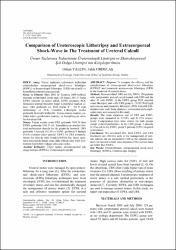Comparison of ureteroscopic lithotripsy and extracorporeal shock-wave in the treatment of ureteral calculi
Abstract
Amaç: Üreter taşlarının tedavisinde kullanılan
yöntemlerden extracorporeal shock-wave lithotripsy
(ESWL) ve üreteroskopik lithotripsy (URS) nin etkinlik ve
komplikasyonlarını karşılaştırmak.
Gereç ve Yöntem: Mart 2001 ile Temmuz 2004 tarihleri
arasında semptomatik üreter taşlı 124 hasta URS, 91 hasta
ESWL yöntemi ile tedavi edildi. ESWL grubunda PCK
firmasının ürettiği Stonelith Smart Lithotripter markalı cihazı,
URS grubunda ise Wolf marka 8 – 9.8 F rijid
üreteroskop ve PCK Calculith Lithotripter marka
pnömatik litotriptör kullanıldı. Taştan arınma oranları, yeniden
tedavi gereksinimi oranları, ve komplikasyon oranları
karşılaştırıldı.
Sonuç: Taştan arınma oranı URS grubunda %93.54 iken
ESWL grubunda %81.31 idi. Komplikasyon oranları üreteral
perforasyon dışında her iki grupta da benzerdi. URS
grubunda 3 hastada (%2.4) ve ESWL grubunda 9 hastada
(%9.8) yeniden tedavi gerekti. ESWL ve URS yöntemlerinden
her ikisi de etkin olmakla birlikte biz, üreter taşlarının
tedavisinde başarı oranı daha yüksek olan URS yönteminin
önerilebilir olduğu sonucuna vardık. Purpose: To compare the efficacy and the
complications of extracorporeal shock-wave lithotripsy
(ESWL)* and pneumatic ureteroscopic lithotripsy (URS)
in the treatment of ureteral stones.
Methods: Between March 2001 and July 20034, 124 patients
with symptomatic ureteral calculi treated with URS and the
other 91 with ESWL. In the ESWL group, PCK stonelith
smart lithotripter and in the URS group 8 – 9.8 Fr Wolf rigid
ureteroscope and pneumatic lithotripter (PCK Calculith Lithotripter)
were used. Stone clearance, re-treatment and complication
rates were assessed in this study.
Results: The stone clearance rate of URS and ESWL
groups were measured as 93.54% and 81.31% respectively.
Complication rates were similar for both groups
except ureteral perforation. In the URS group, 3 patients
(2.4%) and in the ESWL group 9 patients (9.8%) required
re-treatment.
Conclusion: We concluded that, both ESWL and URS
treatments are effective tools in the management of ureteral
calculi, but we recommend URS as the optimal treatment
for ureteral calculi cases because of the success rates
are better than ESWL.
Source
Afyon Kocatepe Üniversitesi, Kocatepe Tıp DergisiVolume
5Issue
3Collections
- Makaleler [452]



















